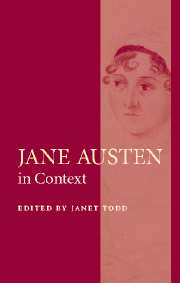38 - Religion
Published online by Cambridge University Press: 19 December 2020
Summary
The moderate eighteenth-century Anglicanism that Jane Austen imbibed at Steventon from her father, the Revd George Austen, emphasised divine wisdom and atonement in theology, order and patriotism in politics and common sense and morality in private life. Most Church of England clergy steered a safe middle course between Enlightenment rationalism, with its attendant dangers of agnosticism and secularisation, and Evangelical ‘enthusiasm’, characterised by intense personal piety. The Established Church was thus in danger of becoming simply a quiet moral presence, rather than a dynamic body which lived out a radical gospel message. (On Easter Day 1800, there were only six communicants at St Paul's Cathedral.) Nevertheless, in the tumultuous final years of the eighteenth century, religion still mattered to the majority of English men and women, and certainly mattered very much to Jane Austen, whose family bonds were strengthened by private and public devotions, and whose novels reflect the teaching and the rhythms of the Authorised Version of the Bible and the Book of Common Prayer.
The moderation that characterises both Austen's fiction and her Anglicanism flows from a pragmatic approach to moral issues and theological truths. Aspects of modernity and progress associated with the Enlightenment project may have threatened conservative Anglican values like Austen’s, but an emphasis upon freedom of thought and enquiry was reassuringly Protestant. Faith in miracles may have been weakened, but the disappearance of witch-hunters was a welcome product of rationalism within the Church, and the Test Acts ensured that a small Roman Catholic, or ‘Papist’ minority kept a low profile in English society.
Much of the energy associated with revivalism had gone out of the Church of England by the middle of the eighteenth century, through the departure of the Wesleys and the growth of Methodism. In the second half of the century, however, Evangelicalism gradually strengthened within the Anglican fold, through the ministries of men like John Fletcher, Henry Venn and John Newton (Cowper's friend and collaborator).
- Type
- Chapter
- Information
- Jane Austen in Context , pp. 406 - 414Publisher: Cambridge University PressPrint publication year: 2005
- 1
- Cited by



